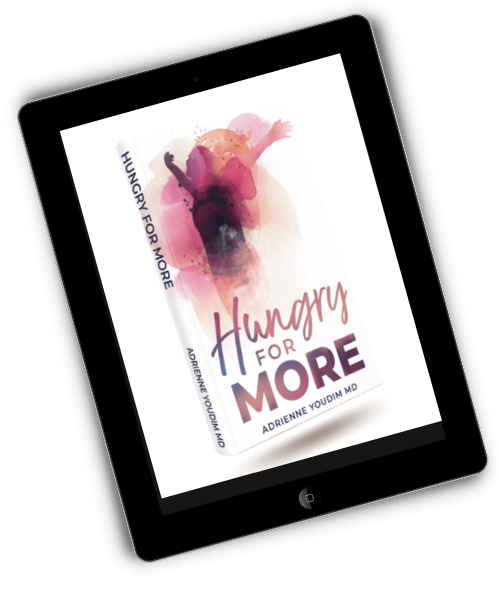Weight loss and body positivity: The presence of social stigma around people who have excess weight
This week, we’re going to talk about weight loss and how that fits in with body positivity, fat shaming, healthy self acceptance, and a big movement towards understanding and accepting who we are as we are in this moment.
And I tell you, as a weight loss physician, a mother to three kids, a former child, teen, and young adult who is personally obsessed with every inch of her body, I am so glad for the body positivity movement. But I’m also glad for the help that I provide my patients every day, helping them change their relationship with food and therefore with themselves, and yes, helping them lose weight. But I wonder what your take is on all this.
And first, I want to start with a story.
So, way back when I was a medical student, I remember doing a pre-op with a well-known surgeon, getting a patient ready for surgery. And so, he did all of his exam and gave her all the information, and right before we were about to leave the door, he grabbed her midsection, shook it in his hands, and said, “You need to do something about this”, and then walked out. I remember standing there mortified. Looking down in my own midsection, wondering how I got myself into this mess. The patient and I looked at each other in shock. It was really an embarrassing moment. And sadly, the studies show that physicians and health professionals across the board have a bias against people with excess weight. In fact, studies show that physicians have bias, nurses have bias, and even psychologists – that one really surprised me – discriminate against people with excess weight.
But discrimination or obesity discrimination or discrimination against people who are overweight and obese occurs in every segment of our society. It’s been shown in the work setting in terms of hiring practices, promotions and wage inequities; it’s been proven in the educational setting; and of course, amongst children and peers. Kids can be mean sometimes. And there’s definitely social stigma around people who have excess weight. And then there’s all these social messaging, social media, the regular media. Because of all this, negative body image is rampant in our society.
Let’s look at the numbers: Statistics on how body dissatisfaction affects people, as well as studies about its consequences in an individual’s way of living
I’ll share some stats.
Body dissatisfaction affects almost 50% of 13 year olds in the United States, it affects 80% of 17 year olds, and can begin as early as age six. And believe it or not, this is not limited to people who are overweight. So, body dissatisfaction exists among “normal weight”, whatever that means, and even underweight individuals, which shows you that the reality really doesn’t matter. It’s just how we perceive ourselves that matters.
And this is not without consequence. Body dissatisfaction, stigma, and fat shaming results in, of course, negative self image. It’s been shown to increase depression and anxiety, low self esteem, and even suicidal thoughts. But there’s physical consequences too. Studies show that fat shaming is actually perceived by the body as a type of stress, and it results in elevations in cortisol as well as metabolic dysfunction. It has even been linked to a higher mortality.
A counterculture turned cancel culture: The feeling of embarrassment coupled with one’s desire to lose weight
Again, I am happy for this new shift, this counterculture that is shining a light on stigma and fat shaming, a counterculture that is finally representing normal size and shape in magazines and billboards. Hopefully, soon gone will be the days when only underweight individuals are presented in our magazines and media images. But an interesting thing has come about with this counter culture, and I would call it a cancel culture. There is a cancel culture against weight loss.
This week, a patient was referred to me by a fellow doc, because she had gained some way over the pandemic and her blood sugars were high – she was diagnosed with pre diabetes – and she was hoping to lose some weight instead of starting medications, but said, “You know, I want to lose weight and I even want to feel and look better, so it’s not just about the diabetes, but I’m kind of embarrassed about wanting to lose weight.”
And I thought to myself, what? What does that even mean? I mean, perhaps for some people, it’s not the right time, or maybe some people are just not interested in engaging in weight loss or in losing weight, and that’s okay, that’s fine. But feeling embarrassed because you want to lose weight, feeling embarrassed because you have identified maybe certain habits in your lifestyle that have resulted in weight gain and you want to eliminate these practices that no longer serve you, that doesn’t make sense to me.
And so I wonder, how can we balance a desire for health, a desire for healthy weight, with body positivity and positive self acceptance?
Tell me why: Excess weight being attributed to literally almost everything an individual does and/or eat
And I want to talk a little bit about the health aspect, because there is also a lot of dialogue about why health is linked to weight, and that in fact, the two should not be linked. And I will say this. I will say that physicians have a really bad habit of attributing everything to excess weight. You go in for a rash, “Why don’t you lose weight?” You go in for a vaccine, they weigh you, “Why don’t you lose weight?” Not everything is linked to excess weight. And sometimes we just have to – not sometimes, all the time – we just have to treat the patient for who he or she is. And that is a failure in the medical profession.
But to say that excess weight is not associated with any health consequence is absolutely false. Studies, anecdote has shown of when people increase in weight to an unhealthy degree, it is associated with a higher risk of diabetes, high blood pressure, high cholesterol, heart disease, sleep apnea, joint problems, fatty liver disease that can go on to fibrosis and liver failure, requiring transplantation, results in reduced ovulation and fertility issues, is associated with a higher risk of certain cancers including breast cancer and colon cancer. There’s an endless list of health consequences of excess weight.
That doesn’t mean you have to be unhealthy, or just because you’re overweight, you necessarily will get all of these or some of these or any of these health consequences. Certainly, people can have excess weight and live just fine and have no consequences of their excess weight. But then again, people can be smokers and not have consequences either. But does that mean that we shouldn’t help people who want to stop smoking to stop smoking?
A forgiving body: Significant benefits of weight loss in terms of cardio and cognition
Now, I don’t want to be doom and gloom here, because the beauty of all of this is that our bodies are so forgiving, and studies have shown time and time again that really modest amounts of weight loss have significant cardio metabolic benefits.
So, 5-10% of weight loss, that means an individual who is 200 pounds, if they lose around 10 pounds, they will start to see benefits of that weight loss: reductions in systolic and diastolic blood pressure, reductions in blood sugar, improvements in obstructive sleep apnea, greater mobility so it reduce joint pain, ovulation will resume in some cases when infertility is related to excess weight. So, the body will start to respond to really modest changes in weight.
Now, some people will say that’s not an effect of weight loss but just healthy eating, but we can’t necessarily tease out the two. And again, remember that those things that help us with weight loss – eating wholesome nutrition food, moving our bodies, getting adequate sleep, sleep deprivation is closely linked to weight gain – all of those things are good for our weight, but guess what? They’re also good for our mood; they’re also good for our cognition. There’s everything to be gained from engaging in the kind of lifestyle that will promote our well being and will likely, as a result, also promote weight loss and their strategies, right? We have effective strategies to this end.
I personally do not subscribe to any dietary interventions. I’m not a keto girl or an intermittent fasting girl, although we do have a podcast coming up with an expert in intermittent fasting. I’m curious to get her takes. But I don’t believe in dieting per se. I believe in mindset shifts around food, which I’ll discuss in a little bit.
There are effective medical strategies that help people, give them tools to help with weight loss. There are medications, surgery in the right candidate, in the right person, behavioral strategies for weight loss, other lifestyle parameters or other lifestyle behaviors like movement, and again, adequate sleep – all of which promote better health, but also better emotional and mental well being.
Mindset as the key: The power of self acceptance and self compassion towards wanting to lose weight without fat shaming
But I want to shift a little bit and talk about mindset, because I think that is the important way in which we link the desire to lose weight with healthy emotional and mental well being. That’s where we can wish to lose weight or promote strategies for weight loss without fat shaming. These things do not have to be mutually exclusive, rather, they don’t have to be synonymous, meaning weight loss does not have to equal fat shaming; they can be mutually exclusive, but it does require a mindset shift, because we have been bombarded by society in terms of measuring our self-worth based on our shape and size. And that kind of long term ingrained mindset is hard to unravel, but is possible.
And so, I like to focus with my patients on a mindset of body positivity and positive self acceptance. And so that means accepting yourself as you are for who you are in this moment. You may want to change certain things about your lifestyle, you may want to engage in weight loss, but having a goal does not mean that we don’t accept ourselves as we are right now. We can have self acceptance and still strive to do better. And in fact, the studies show that positive self acceptance is very closely related to the ability to actually make effective change. So it’s not only the nice thing to do for ourselves, but it’s also the effective thing to do. Having positive self acceptance is associated with habit change, successful habit change.
Along the same lines, self compassion, and self compassion practices are associated with successful habit change. And so, being able to have compassion for ourselves in those moments of failure or imperfection is associated with being able to achieve our goals. And think about it. If you suffer imperfection, which we all will, because by definition, to be perfect is impossible; it’s an untenable goal. So when we can meet ourselves in our moments of imperfection with kindness, with compassion, we are more likely to be able to pick ourselves up, dust ourselves off, and move forward with our goal. Whereas if we get into shaming ourselves or negative self talk or self deprecation, we’re too busy pooping all over ourselves in order to put any energy towards effective change.
So, positive self acceptance and self compassion is not only, again, kind, and is an antidote, I think, to fat shaming, but it is also effective.
More of the mindset shift: Moving along with practical principles towards a better journey towards body positivity and weight loss
Some other mindset shifts that I like to talk about in terms of weight loss strategies is a mindset of abundance, a mindset of abundance and not restriction.
So diet, by definition, evokes a feeling of restriction. So it isn’t by definition restriction, diet just means what we eat, but in our society, we have made diet synonymous with restriction. And restriction will invariably make us feel like we want that thing, right? Tell your kid that they can’t have a cookie, and they’re obsessed with that cookie. Tell your toddler that they can’t play with that toy, and they’re obsessed with that toy. We are very much the same. So rather than thinking of it as restriction, think about it as abundance. Eat so much of what serves you. Eat so much of the good things: fruits and vegetables, lean proteins, healthy carbohydrates, and legumes. Eat so much of what serves you that there is less room and less desire for the things that do not.
Another shift in thinking is focusing on small changes.
There’s actually a study that surveyed individuals who wanted to lose weight, and the participants stated that they would not be happy with their weight loss unless they lost at least 50 pounds. Holy moly. Let’s start small, because small changes have big impact. Small changes, when done consistently, result in big impact. And think about it. Two pounds per week, which is a very modest amount of weight loss, results in eight pounds a month, results in almost 25 pounds in three months. Even half of that – 10 to 12 pounds in three months – is a huge win.
Some other principles that I talk about are our practical principles.
So, practical principles like eat more from the earth less from the pantry, right? Eat more whole foods and less processed and packaged foods. Eat as much protein as you can. No one ever gained weight from chicken or fish. Protein, actually, will help, as I’ve said many times, help curb appetite. It is the macronutrient that most successfully helps control hunger hormones. Half your plate green, and by that I mean, veggies of all your colors. So, double up in your volume of your protein and carbs, in volume of your veggies. Eat your colors because every color provides you with a different nutrient, vitamin, mineral, antioxidant. And so when you are nourished, you are less hungry, and there’s a mindset there of actually nourishing yourself, serving yourself, which leads me to another mindset shift.
Ask yourself, “how does this serve me?” and make your food matter. If it serves you in terms of nutrition, great. If it serves you, perhaps, in an emotional way, it’s the Thanksgiving dinner, great. But we can all agree that sitting in front of the TV, munching on chips, that doesn’t serve us.
Other principle is say yes to carbs. Don’t vilify carbohydrates and don’t put them all under the same banner. A cup of beans is not the same as a pop tart. Carbs are good. Complex carbohydrates like beans, grains, legumes will help stabilize your blood sugar and prevent you from crashing, getting hungry, and having cravings. And don’t drink your calories, even if that means juice. Drinks have really little to no nutritional value, and even if you’re having fruit juice, you get much more out of it when you eat the whole fruit.
And my favorite mindset shift is eat as if you give a damn about yourself. Eat like you really care for yourself.
How’s that for a paradigm shift?
Dr. Adrienne’s parting advice: “Do it with kindness.”
So if you’re considering weight loss, please don’t be ashamed. Meet yourself with self acceptance. Please watch the negative self talk. Please watch the body dissatisfaction. Please watch for self deprecation. And kindly remind yourself to engage in this process with kindness. Find an army that can help you. Maybe that’s a medical doctor like myself, maybe it’s a registered dietician and nutritionist and health coach, a life coach.
It’s not all about weight; it really isn’t. But when we change our relationship with food, we change our relationship with ourselves. When we put time for cooking, prepping, we are making a statement that we matter and we are worth the time and the effort that it takes to care for ourselves. When we make time for movement and exercise, again, we are showing ourselves that we are worthy of that time and effort. Making these changes are not only good for your body, but they’re also good for your mind, for your cognition, for your productivity, for your mental, emotional well being, and the studies all show this. Wholesome eating, movement, sleep – they all serve the same purpose.
And then finally, I will end with this once again, which is to do it with kindness, to do it with self compassion, because that is not only the nice way to do it, but also the effective way to do it.
I would love if you find me on Instagram and let me know how these tools served you. Let me know what your biggest cravings are and how you’re managing them.
You can also shoot me an email HERE. I read every single one of my emails myself. You can also find other offerings like journal exercises, my book Hungry For More, and a catalog of our prior podcasts.
To a happy and healthy week.


